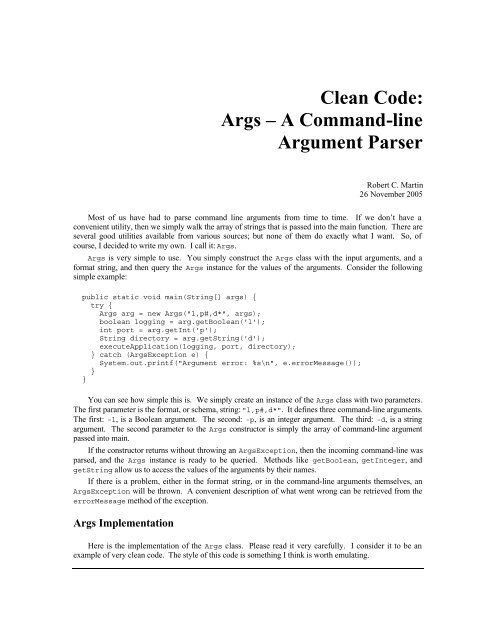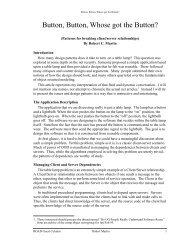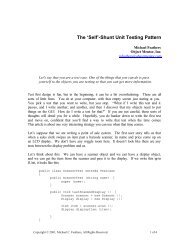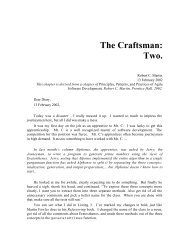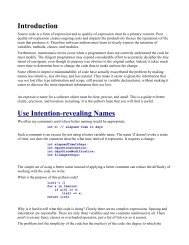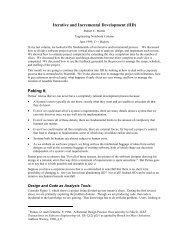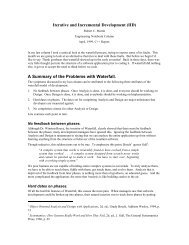Clean Code: Args â A Command-line Argument Parser - Object Mentor
Clean Code: Args â A Command-line Argument Parser - Object Mentor
Clean Code: Args â A Command-line Argument Parser - Object Mentor
Create successful ePaper yourself
Turn your PDF publications into a flip-book with our unique Google optimized e-Paper software.
are in the <strong>Args</strong>Exception class:import static com.objectmentor.utilities.args.<strong>Args</strong>Exception.Error<strong>Code</strong>.*;public class <strong>Args</strong>Exception extends Exception {private char error<strong>Argument</strong>Id = '\0';private String errorParameter = null;private Error<strong>Code</strong> error<strong>Code</strong> = OK;public <strong>Args</strong>Exception() {}public <strong>Args</strong>Exception(String message) {super(message);}public <strong>Args</strong>Exception(Error<strong>Code</strong> error<strong>Code</strong>) {this.error<strong>Code</strong> = error<strong>Code</strong>;}public <strong>Args</strong>Exception(Error<strong>Code</strong> error<strong>Code</strong>, String errorParameter) {this.error<strong>Code</strong> = error<strong>Code</strong>;this.errorParameter = errorParameter;}public <strong>Args</strong>Exception(Error<strong>Code</strong> error<strong>Code</strong>,char error<strong>Argument</strong>Id, String errorParameter) {this.error<strong>Code</strong> = error<strong>Code</strong>;this.errorParameter = errorParameter;this.error<strong>Argument</strong>Id = error<strong>Argument</strong>Id;}public char getError<strong>Argument</strong>Id() {return error<strong>Argument</strong>Id;}public void setError<strong>Argument</strong>Id(char error<strong>Argument</strong>Id) {this.error<strong>Argument</strong>Id = error<strong>Argument</strong>Id;}public String getErrorParameter() {return errorParameter;}public void setErrorParameter(String errorParameter) {this.errorParameter = errorParameter;}public Error<strong>Code</strong> getError<strong>Code</strong>() {return error<strong>Code</strong>;}public void setError<strong>Code</strong>(Error<strong>Code</strong> error<strong>Code</strong>) {this.error<strong>Code</strong> = error<strong>Code</strong>;}public String errorMessage() {switch (error<strong>Code</strong>) {case OK:return "TILT: Should not get here.";case UNEXPECTED_ARGUMENT:return String.format("<strong>Argument</strong> -%c unexpected.", error<strong>Argument</strong>Id);case MISSING_STRING:return String.format("Could not find string parameter for -%c.",
}error<strong>Argument</strong>Id);case INVALID_INTEGER:return String.format("<strong>Argument</strong> -%c expects an integer but was '%s'.",error<strong>Argument</strong>Id, errorParameter);case MISSING_INTEGER:return String.format("Could not find integer parameter for -%c.",error<strong>Argument</strong>Id);case INVALID_DOUBLE:return String.format("<strong>Argument</strong> -%c expects a double but was '%s'.",error<strong>Argument</strong>Id, errorParameter);case MISSING_DOUBLE:return String.format("Could not find double parameter for -%c.",error<strong>Argument</strong>Id);case INVALID_ARGUMENT_NAME:return String.format("'%c' is not a valid argument name.",error<strong>Argument</strong>Id);case INVALID_ARGUMENT_FORMAT:return String.format("'%s' is not a valid argument format.",errorParameter);}return "";}public enum Error<strong>Code</strong> {OK, INVALID_ARGUMENT_FORMAT, UNEXPECTED_ARGUMENT, INVALID_ARGUMENT_NAME,MISSING_STRING,MISSING_INTEGER, INVALID_INTEGER,MISSING_DOUBLE, INVALID_DOUBLE}It’s remarkable how much code is required to flesh out the details of this simple concept. One of thereasons for this is that we are using a particularly wordy language. Java, being a statically typed language,requires a lot of words in order to satisfy the type system. In a language like Ruby, Python, or Smalltalk,this program would be much smaller.Please read the code over one more time. Pay special attention to the way things are named, the size ofthe functions, and the formatting of the code. If you are an experienced programmer, you may have somequibbles here and there with various parts of the style or structure. Overall, however, I would expect you toconclude that this program is very nicely written, with a very clean structure.For example, it should be obvious how you would add a new argument type, such as a date argument,or a complex number argument; and that such an addition would require a trivial amount of effort. In short,it would simply require a new derivative of <strong>Argument</strong>Marshaler, a new getXXX function, and a new casestatement in the parseSchemaElement function. There would also probably be a new <strong>Args</strong>-Exception.Error<strong>Code</strong>, and a new error message.How did I do this?Let me set your mind at rest. I did not simply write this program from beginning to end in its currentform. More importantly, I am not expecting you to be able to write clean and elegant programs in one pass.If we have learned anything over the last couple of decades, it is that programming is a craft, more than it isa science. To write clean code, you must first write dirty code; and then clean it.This should not be a surprise to you. We learned this truth in grade school when our teachers tried(usually in vain) to get us to write rough drafts of our compositions. The process, they told us, was that weshould write a rough draft, then a second draft, then N subsequent drafts until we had our final version.Writing clean compositions, they tried to tell us, is a matter of successive refinement.Most freshman programmers (like most gradeshoolers) don’t follow this advice particularly well.They believe that the primary goal is to get the program working. Once it’s “working” they move on to the
next task, leaving the “working” program in whatever state they finally got it to “work”. Most seasonedprogrammers know that this is professional suicide.Is Successive Refinement Cost Effective?If you have been a programmer for more than two or three years, you have probably been significantlyslowed down by someone else’s messy code. If you have been a programmer for longer than two or threeyears, you have probably been slowed down by your own messy code. The degree of the slow-down can besignificant. Over the span of a year or two, teams that were moving very fast at the beginning of a projectcan find themselves moving at a snail’s pace. Every change they make to the code breaks two or threeother parts of the code. No change is trivial. Every addition or modification to the system requires that thetangles, twists, and knots be “understood” so that more tangles, twists, and knots can be added. Over timethe mess becomes so big and so deep and so tall, they can not clean it up. There is no way at all.As the mess builds, the productivity of the team continues to decrease, asymptotically approachingzero. As productivity decreases, management does the only thing they can; they add more staff to theproject in hopes of increasing productivity. But that new staff is not versed in the design of the system.They don’t know the difference between a change that matches the design intent, and a change that thwartsthe design intent. Furthermore, they, and everyone else on the team are under horrific pressure to increaseproductivity. So they all make more and more messes, driving the productivity ever further towards zero.Productivity vs Time10080Productivity6040200TimeEventually the team rebels; and they inform management that they cannot continue to develop in thishorrific code base. They demand a redesign. Management does not want to expend the resources on awhole new redesign of the project, but they cannot deny that productivity is terrible. Eventually they bendto the demands of the developers, and authorize the grand redesign in the sky.A new tiger team is selected. Everyone wants to be on this team because it’s a green-field project.They get to start over and create something truly beautiful. But only the best and brightest are chosen forthe tiger team. Everyone else must continue to maintain the current system.Now the two teams are in a race. The tiger team must build a new system that does everything that theold system does. Not only that, they have to keep up with the changes that are continuously being made tothe old system. Management will not replace the old system until the new system can do everything thatthe old system does, on the day of the change.This race can go on for a very long time. I’ve seen it take 10 years. And by the time it’s done, theoriginal members of the tiger team are long gone, and the current members are demanding that the newsystem be redesigned because it’s such a mess.If you have experienced even one small part of the story I just told, then you already know thatspending time keeping your code clean is not just cost effective; it’s a matter of professional survival.<strong>Args</strong>: the rough draft.
Below is an early version of the <strong>Args</strong> class. It “works”. And it’s messy.package com.objectmentor.utilities.getopts;import java.text.ParseException;import java.util.*;public class <strong>Args</strong> {private String schema;private String[] args;private boolean valid = true;private Set unexpected<strong>Argument</strong>s = new TreeSet();private Map boolean<strong>Args</strong> =new HashMap();private Map string<strong>Args</strong> = new HashMap();private Map int<strong>Args</strong> = new HashMap();private Set argsFound = new HashSet();private int current<strong>Argument</strong>;private char error<strong>Argument</strong>Id = '\0';private String errorParameter = "TILT";private Error<strong>Code</strong> error<strong>Code</strong> = Error<strong>Code</strong>.OK;private enum Error<strong>Code</strong> {OK, MISSING_STRING, MISSING_INTEGER, INVALID_INTEGER, UNEXPECTED_ARGUMENT}public <strong>Args</strong>(String schema, String[] args) throws ParseException {this.schema = schema;this.args = args;valid = parse();}private boolean parse() throws ParseException {if (schema.length() == 0 && args.length == 0)return true;parseSchema();try {parse<strong>Argument</strong>s();} catch (<strong>Args</strong>Exception e) {}return valid;}private boolean parseSchema() throws ParseException {for (String element : schema.split(",")) {if (element.length() > 0) {String trimmedElement = element.trim();parseSchemaElement(trimmedElement);}}return true;}private void parseSchemaElement(String element) throws ParseException {char elementId = element.charAt(0);String elementTail = element.substring(1);validateSchemaElementId(elementId);if (isBooleanSchemaElement(elementTail))parseBooleanSchemaElement(elementId);else if (isStringSchemaElement(elementTail))parseStringSchemaElement(elementId);else if (isIntegerSchemaElement(elementTail)) {parseIntegerSchemaElement(elementId);
}} else {throw new ParseException(String.format("<strong>Argument</strong>: %c has invalid format: %s.",elementId, elementTail), 0);}private void validateSchemaElementId(char elementId) throws ParseException {if (!Character.isLetter(elementId)) {throw new ParseException("Bad character:" + elementId + "in <strong>Args</strong> format: " + schema, 0);}}private void parseBooleanSchemaElement(char elementId) {boolean<strong>Args</strong>.put(elementId, false);}private void parseIntegerSchemaElement(char elementId) {int<strong>Args</strong>.put(elementId, 0);}private void parseStringSchemaElement(char elementId) {string<strong>Args</strong>.put(elementId, "");}private boolean isStringSchemaElement(String elementTail) {return elementTail.equals("*");}private boolean isBooleanSchemaElement(String elementTail) {return elementTail.length() == 0;}private boolean isIntegerSchemaElement(String elementTail) {return elementTail.equals("#");}private boolean parse<strong>Argument</strong>s() throws <strong>Args</strong>Exception {for (current<strong>Argument</strong> = 0; current<strong>Argument</strong> < args.length; current<strong>Argument</strong>++){String arg = args[current<strong>Argument</strong>];parse<strong>Argument</strong>(arg);}return true;}private void parse<strong>Argument</strong>(String arg) throws <strong>Args</strong>Exception {if (arg.startsWith("-"))parseElements(arg);}private void parseElements(String arg) throws <strong>Args</strong>Exception {for (int i = 1; i < arg.length(); i++)parseElement(arg.charAt(i));}private void parseElement(char argChar) throws <strong>Args</strong>Exception {if (set<strong>Argument</strong>(argChar))argsFound.add(argChar);else {unexpected<strong>Argument</strong>s.add(argChar);error<strong>Code</strong> = Error<strong>Code</strong>.UNEXPECTED_ARGUMENT;
}valid = false;}private boolean set<strong>Argument</strong>(char argChar) throws <strong>Args</strong>Exception {if (isBooleanArg(argChar))setBooleanArg(argChar, true);else if (isStringArg(argChar))setStringArg(argChar);else if (isIntArg(argChar))setIntArg(argChar);elsereturn false;}return true;private boolean isIntArg(char argChar) {return int<strong>Args</strong>.containsKey(argChar);}private void setIntArg(char argChar) throws <strong>Args</strong>Exception {current<strong>Argument</strong>++;String parameter = null;try {parameter = args[current<strong>Argument</strong>];int<strong>Args</strong>.put(argChar, new Integer(parameter));} catch (ArrayIndexOutOfBoundsException e) {valid = false;error<strong>Argument</strong>Id = argChar;error<strong>Code</strong> = Error<strong>Code</strong>.MISSING_INTEGER;throw new <strong>Args</strong>Exception();} catch (NumberFormatException e) {valid = false;error<strong>Argument</strong>Id = argChar;errorParameter = parameter;error<strong>Code</strong> = Error<strong>Code</strong>.INVALID_INTEGER;throw new <strong>Args</strong>Exception();}}private void setStringArg(char argChar) throws <strong>Args</strong>Exception {current<strong>Argument</strong>++;try {string<strong>Args</strong>.put(argChar, args[current<strong>Argument</strong>]);} catch (ArrayIndexOutOfBoundsException e) {valid = false;error<strong>Argument</strong>Id = argChar;error<strong>Code</strong> = Error<strong>Code</strong>.MISSING_STRING;throw new <strong>Args</strong>Exception();}}private boolean isStringArg(char argChar) {return string<strong>Args</strong>.containsKey(argChar);}private void setBooleanArg(char argChar, boolean value) {boolean<strong>Args</strong>.put(argChar, value);}private boolean isBooleanArg(char argChar) {return boolean<strong>Args</strong>.containsKey(argChar);}
public int cardinality() {return argsFound.size();}public String usage() {if (schema.length() > 0)return "-[" + schema + "]";elsereturn "";}public String errorMessage() throws Exception {switch (error<strong>Code</strong>) {case OK:throw new Exception("TILT: Should not get here.");case UNEXPECTED_ARGUMENT:return unexpected<strong>Argument</strong>Message();case MISSING_STRING:return String.format("Could not find string parameter for -%c.",error<strong>Argument</strong>Id);case INVALID_INTEGER:return String.format("<strong>Argument</strong> -%c expects an integer but was '%s'.",error<strong>Argument</strong>Id, errorParameter);case MISSING_INTEGER:return String.format("Could not find integer parameter for -%c.",error<strong>Argument</strong>Id);}return "";}private String unexpected<strong>Argument</strong>Message() {StringBuffer message = new StringBuffer("<strong>Argument</strong>(s) -");for (char c : unexpected<strong>Argument</strong>s) {message.append(c);}message.append(" unexpected.");}return message.toString();public boolean getBoolean(char arg) {return falseIfNull(boolean<strong>Args</strong>.get(arg));}private boolean falseIfNull(Boolean b) {return b != null && b;}public String getString(char arg) {return blankIfNull(string<strong>Args</strong>.get(arg));}public int getInt(char arg) {return zeroIfNull(int<strong>Args</strong>.get(arg));}private int zeroIfNull(Integer i) {return i == null ? 0 : i;}private String blankIfNull(String s) {return s == null ? "" : s;}
}public boolean has(char arg) {return argsFound.contains(arg);}public boolean isValid() {return valid;}private class <strong>Args</strong>Exception extends Exception {}I hope your initial reaction to this mass of code is: “I’m certainly glad he didn’t leave it like that!” Ifyou feel like this, then remember that’s how other people are going to feel about code that you leave inrough-draft form.Actually “rough-draft” is probably the kindest thing you can say about this code. It’s clearly a workin-progress.The sheer number of instance variables is daunting. The odd strings like “TILT”, theHashSets and TreeSets, and the try-catch-catch blocks, all add up to a festering pile.I had not wanted to write a festering pile. Indeed, I was trying to keep things reasonably wellorganized. You can probably tell that from my choice of function and variable names; and the fact thatthere is a crude structure to the program. But, clearly, I had let the problem get away from me.The mess built gradually. Earlier versions had not been nearly so nasty. For example, here is anearlier version in which only Boolean arguments were working.package com.objectmentor.utilities.getopts;import java.util.*;public class <strong>Args</strong> {private String schema;private String[] args;private boolean valid;private Set unexpected<strong>Argument</strong>s = new TreeSet();private Map boolean<strong>Args</strong> =new HashMap();private int numberOf<strong>Argument</strong>s = 0;public <strong>Args</strong>(String schema, String[] args) {this.schema = schema;this.args = args;valid = parse();}public boolean isValid() {return valid;}private boolean parse() {if (schema.length() == 0 && args.length == 0)return true;parseSchema();parse<strong>Argument</strong>s();return unexpected<strong>Argument</strong>s.size() == 0;}private boolean parseSchema() {for (String element : schema.split(",")) {parseSchemaElement(element);}return true;
}private void parseSchemaElement(String element) {if (element.length() == 1) {parseBooleanSchemaElement(element);}}private void parseBooleanSchemaElement(String element) {char c = element.charAt(0);if (Character.isLetter(c)) {boolean<strong>Args</strong>.put(c, false);}}private boolean parse<strong>Argument</strong>s() {for (String arg : args)parse<strong>Argument</strong>(arg);return true;}private void parse<strong>Argument</strong>(String arg) {if (arg.startsWith("-"))parseElements(arg);}private void parseElements(String arg) {for (int i = 1; i < arg.length(); i++)parseElement(arg.charAt(i));}private void parseElement(char argChar) {if (isBoolean(argChar)) {numberOf<strong>Argument</strong>s++;setBooleanArg(argChar, true);} elseunexpected<strong>Argument</strong>s.add(argChar);}private void setBooleanArg(char argChar, boolean value) {boolean<strong>Args</strong>.put(argChar, value);}private boolean isBoolean(char argChar) {return boolean<strong>Args</strong>.containsKey(argChar);}public int cardinality() {return numberOf<strong>Argument</strong>s;}public String usage() {if (schema.length() > 0)return "-["+schema+"]";elsereturn "";}public String errorMessage() {if (unexpected<strong>Argument</strong>s.size() > 0) {return unexpected<strong>Argument</strong>Message();} elsereturn "";
}private String unexpected<strong>Argument</strong>Message() {StringBuffer message = new StringBuffer("<strong>Argument</strong>(s) -");for (char c : unexpected<strong>Argument</strong>s) {message.append(c);}message.append(" unexpected.");}return message.toString();}public boolean getBoolean(char arg) {return boolean<strong>Args</strong>.get(arg);}Although you can find plenty to complain about in this code, it’s really not all that bad. It’s compactand simple, and easy to understand. However, within this code it is easy to see the seeds of the laterfestering pile. It’s quite clear how this grew into the latter mess.Notice that the latter mess has only two more argument types than this: string and integer. Theaddition of just two more argument types had a massive negative impact on the code. It converted it fromsomething that would have been reasonably maintainable, into something that I would expect to becomeriddled with bugs and warts.I added the two argument types incrementally. First I added the string argument, which yielded this:package com.objectmentor.utilities.getopts;import java.text.ParseException;import java.util.*;public class <strong>Args</strong> {private String schema;private String[] args;private boolean valid = true;private Set unexpected<strong>Argument</strong>s = new TreeSet();private Map boolean<strong>Args</strong> =new HashMap();private Map string<strong>Args</strong> =new HashMap();private Set argsFound = new HashSet();private int current<strong>Argument</strong>;private char error<strong>Argument</strong> = '\0';enum Error<strong>Code</strong> {OK, MISSING_STRING}private Error<strong>Code</strong> error<strong>Code</strong> = Error<strong>Code</strong>.OK;public <strong>Args</strong>(String schema, String[] args) throws ParseException {this.schema = schema;this.args = args;valid = parse();}private boolean parse() throws ParseException {if (schema.length() == 0 && args.length == 0)return true;parseSchema();parse<strong>Argument</strong>s();return valid;}
private boolean parseSchema() throws ParseException {for (String element : schema.split(",")) {if (element.length() > 0) {String trimmedElement = element.trim();parseSchemaElement(trimmedElement);}}return true;}private void parseSchemaElement(String element) throws ParseException {char elementId = element.charAt(0);String elementTail = element.substring(1);validateSchemaElementId(elementId);if (isBooleanSchemaElement(elementTail))parseBooleanSchemaElement(elementId);else if (isStringSchemaElement(elementTail))parseStringSchemaElement(elementId);}private void validateSchemaElementId(char elementId) throws ParseException {if (!Character.isLetter(elementId)) {throw new ParseException("Bad character:" + elementId + "in <strong>Args</strong> format: " + schema, 0);}}private void parseStringSchemaElement(char elementId) {string<strong>Args</strong>.put(elementId, "");}private boolean isStringSchemaElement(String elementTail) {return elementTail.equals("*");}private boolean isBooleanSchemaElement(String elementTail) {return elementTail.length() == 0;}private void parseBooleanSchemaElement(char elementId) {boolean<strong>Args</strong>.put(elementId, false);}private boolean parse<strong>Argument</strong>s() {for (current<strong>Argument</strong> = 0; current<strong>Argument</strong> < args.length; current<strong>Argument</strong>++){String arg = args[current<strong>Argument</strong>];parse<strong>Argument</strong>(arg);}return true;}private void parse<strong>Argument</strong>(String arg) {if (arg.startsWith("-"))parseElements(arg);}private void parseElements(String arg) {for (int i = 1; i < arg.length(); i++)parseElement(arg.charAt(i));}
private void parseElement(char argChar) {if (set<strong>Argument</strong>(argChar))argsFound.add(argChar);else {unexpected<strong>Argument</strong>s.add(argChar);valid = false;}}private boolean set<strong>Argument</strong>(char argChar) {boolean set = true;if (isBoolean(argChar))setBooleanArg(argChar, true);else if (isString(argChar))setStringArg(argChar, "");elseset = false;}return set;private void setStringArg(char argChar, String s) {current<strong>Argument</strong>++;try {string<strong>Args</strong>.put(argChar, args[current<strong>Argument</strong>]);} catch (ArrayIndexOutOfBoundsException e) {valid = false;error<strong>Argument</strong> = argChar;error<strong>Code</strong> = Error<strong>Code</strong>.MISSING_STRING;}}private boolean isString(char argChar) {return string<strong>Args</strong>.containsKey(argChar);}private void setBooleanArg(char argChar, boolean value) {boolean<strong>Args</strong>.put(argChar, value);}private boolean isBoolean(char argChar) {return boolean<strong>Args</strong>.containsKey(argChar);}public int cardinality() {return argsFound.size();}public String usage() {if (schema.length() > 0)return "-[" + schema + "]";elsereturn "";}public String errorMessage() throws Exception {if (unexpected<strong>Argument</strong>s.size() > 0) {return unexpected<strong>Argument</strong>Message();} elseswitch (error<strong>Code</strong>) {case MISSING_STRING:return String.format("Could not find string parameter for -%c.",error<strong>Argument</strong>);
}case OK:throw new Exception("TILT: Should not get here.");}return "";private String unexpected<strong>Argument</strong>Message() {StringBuffer message = new StringBuffer("<strong>Argument</strong>(s) -");for (char c : unexpected<strong>Argument</strong>s) {message.append(c);}message.append(" unexpected.");}return message.toString();}public boolean getBoolean(char arg) {return falseIfNull(boolean<strong>Args</strong>.get(arg));}private boolean falseIfNull(Boolean b) {return b == null ? false : b;}public String getString(char arg) {return blankIfNull(string<strong>Args</strong>.get(arg));}private String blankIfNull(String s) {return s == null ? "" : s;}public boolean has(char arg) {return argsFound.contains(arg);}public boolean isValid() {return valid;}You can see that this is starting to get out of hand. It’s still not horrible; but the mess is certainlystarting to grow. It’s a pile, but it’s not festering quite yet. It took the addition of the integer argumenttype to get this pile really fermenting and festering.So I stopped.I had at least two more argument types to add, and I could tell that they would make things muchworse. If I bulldozed my way forward, I could probably get them to work; but I’d leave behind a mess thatwas too large to fix. If the structure of this code was ever going to be maintainable, now was the time to fixit.So I stopped adding features, and started refactoring. Having just added the string and integerarguments, I knew that each argument type required new code in three major places. First, each argumenttype required some way to parse its schema element, in order to select the HashMap for that type. Next,each argument type needed to be parsed in the command-<strong>line</strong> strings and converted to its true type. Finally,each argument type needed a getXXX method so that it could be returned to the caller as its true type.Many different types, all with similar methods, that sounds like a class to me. And so the<strong>Argument</strong>Marshaler concept was born.
On IncrementalismOne of the best ways to ruin a program is to make massive changes to its structure in the name ofimprovement. Some programs never recover from such “improvements”. The problem is that it’s veryhard to get the program working the same way it worked before the “improvement”.To avoid this, I use the discip<strong>line</strong> of Test Driven Development (TDD). One of the central doctrines ofthis approach is to keep the system running at all times. In other words, using TDD, I am not allowed tomake a change to the system that breaks that system. Every change I make must keep the system working,as it worked before.To achieve this, I need a suite of automated tests that I can run on a whim, that verifies that thebehavior of the system is unchanged. For the <strong>Args</strong> class, I had created a suite of unit and acceptance testswhile I was building the festering pile. The unit tests were written in Java and administered by JUnit. Theacceptance tests were written as wiki pages in FitNesse. I could run these tests any time I wanted, and ifthey passed, I was confident that the system was working as I specified.So I proceeded to make a large number of very tiny changes. Each change moved the structure of thesystem towards the <strong>Argument</strong>Marshaler concept. And yet, each change kept the system working. Thefirst change I made was to add the skeleton of the <strong>Argument</strong>Marshaller to the end of the festering pile.private class <strong>Argument</strong>Marshaler {private boolean booleanValue = false;public void setBoolean(boolean value) {booleanValue = value;}}public boolean getBoolean() {return booleanValue;}}private class Boolean<strong>Argument</strong>Marshaler extends <strong>Argument</strong>Marshaler {}private class String<strong>Argument</strong>Marshaler extends <strong>Argument</strong>Marshaler {}private class Integer<strong>Argument</strong>Marshaler extends <strong>Argument</strong>Marshaler {}Clearly this wasn’t going to break anything. So then I made the simplest modification I could, thatwould break as little as possible. I changed the HashMap for the Boolean arguments to take an<strong>Argument</strong>Marshaler.private Map boolean<strong>Args</strong> =new HashMap();This broke a few statements, which I quickly fixed.private void parseBooleanSchemaElement(char elementId) {boolean<strong>Args</strong>.put(elementId, new Boolean<strong>Argument</strong>Marshaler());}private void setBooleanArg(char argChar, boolean value) {boolean<strong>Args</strong>.get(argChar).setBoolean(value);}public boolean getBoolean(char arg) {return falseIfNull(boolean<strong>Args</strong>.get(arg).getBoolean());}
Notice how these changes are in exactly the areas that I had mentioned before. The parse, set, and getfor the argument type. Unfortunately, small as this change was, some of the tests started failing. If youlook carefully at getBoolean you’ll see that if you call it with ‘y’, but there is no ‘y’ argument, thenboolean<strong>Args</strong>.get(‘y’) will return null; and the function will throw a NullPointer exception. ThefalseIfNull function had been used to protect against this, but the change I made caused that function tobecome irrelevant.Incrementalism demands that I get this working quickly, before making any other changes. Indeed, thefix is not too difficult. I just have to move the check for null. It is no longer the boolean that I need tocheck, it’s the <strong>Argument</strong>Marshaller.First I removed the falseIfNull call in the getBoolean function. It was useless now, so I alsoeliminated the function itself. The tests still failed in the same way, so I was confident that I hadn’tintroduced any new errors.public boolean getBoolean(char arg) {return boolean<strong>Args</strong>.get(arg).getBoolean();}Next I split the function into two <strong>line</strong>s and put the <strong>Argument</strong>Marshaller into its own variable.public boolean getBoolean(char arg) {<strong>Args</strong>.<strong>Argument</strong>Marshaler argumentMarshaler = boolean<strong>Args</strong>.get(arg);return argumentMarshaler.getBoolean();}I didn’t care for the long variable name; it was badly redundant and cluttered up the function. So Ishortened it to ‘am’.public boolean getBoolean(char arg) {<strong>Args</strong>.<strong>Argument</strong>Marshaler am = boolean<strong>Args</strong>.get(arg);return am.getBoolean();}And then I put in the null detection logic.public boolean getBoolean(char arg) {<strong>Args</strong>.<strong>Argument</strong>Marshaler am = boolean<strong>Args</strong>.get(arg);return am != null && am.getBoolean();}At this point you might be wondering if you should keep reading. After all, if I continue to walk youthrough the changes I made in such fine grained detail, it’s going to take a lot of words and space. I suspectthat you might not have the time to invest in such a project. So from this point on I’m going to pick up thepace and spare you the minute details.Keep in mind, however, that even though we’re going to start moving faster through the chain ofrefactorings, each one was made just like the one above. The steps were tiny.String <strong>Argument</strong>sAdding String arguments was very similar to adding boolean arguments. I had to change theHashMap, and get the parse, set, and get functions working. There shouldn’t be any surprises in whatfollows except, perhaps, that I seem to be putting all the marshalling implementation in the<strong>Argument</strong>Marshaller base class instead of distributing it to the derivatives. All in good time, dearie.
private Map string<strong>Args</strong> =new HashMap();private void parseStringSchemaElement(char elementId) {string<strong>Args</strong>.put(elementId, new String<strong>Argument</strong>Marshaler());}private void setStringArg(char argChar) throws <strong>Args</strong>Exception {current<strong>Argument</strong>++;try {string<strong>Args</strong>.get(argChar).setString(args[current<strong>Argument</strong>]);} catch (ArrayIndexOutOfBoundsException e) {valid = false;error<strong>Argument</strong>Id = argChar;error<strong>Code</strong> = Error<strong>Code</strong>.MISSING_STRING;throw new <strong>Args</strong>Exception();}}public String getString(char arg) {<strong>Args</strong>.<strong>Argument</strong>Marshaler am = string<strong>Args</strong>.get(arg);return am == null ? "" : am.getString();}private class <strong>Argument</strong>Marshaler {private boolean booleanValue = false;private String stringValue;}public void setBoolean(boolean value) {booleanValue = value;}public boolean getBoolean() {return booleanValue;}public void setString(String s) {stringValue = s;}public String getString() {return stringValue == null ? "" : stringValue;}Again, these changes were made one at a time and in such a way that the tests kept running, if notpassing. When a test broke, I made sure to get it passing again before continuing with the next change.By now you should be able to see my intent. One I get all the current marshalling behavior into the<strong>Argument</strong>Marshaler base class, I’m going to start pushing that behavior down into the derivatives. Thiswill allow me to keep everything running while I gradually change the shape of this program.The obvious next step is to move the integer argument functionality into the <strong>Argument</strong>Marshaler.Again, there aren’t any surprises.private Map int<strong>Args</strong> =new HashMap();private void parseIntegerSchemaElement(char elementId) {int<strong>Args</strong>.put(elementId, new Integer<strong>Argument</strong>Marshaler());}private void setIntArg(char argChar) throws <strong>Args</strong>Exception {current<strong>Argument</strong>++;String parameter = null;try {parameter = args[current<strong>Argument</strong>];int<strong>Args</strong>.get(argChar).setInteger(Integer.parseInt(parameter));
} catch (ArrayIndexOutOfBoundsException e) {valid = false;error<strong>Argument</strong>Id = argChar;error<strong>Code</strong> = Error<strong>Code</strong>.MISSING_INTEGER;throw new <strong>Args</strong>Exception();} catch (NumberFormatException e) {valid = false;error<strong>Argument</strong>Id = argChar;errorParameter = parameter;error<strong>Code</strong> = Error<strong>Code</strong>.INVALID_INTEGER;throw new <strong>Args</strong>Exception();}}public int getInt(char arg) {<strong>Args</strong>.<strong>Argument</strong>Marshaler am = int<strong>Args</strong>.get(arg);return am == null ? 0 : am.getInteger();}private class <strong>Argument</strong>Marshaler {private boolean booleanValue = false;private String stringValue;private int integerValue;}public void setBoolean(boolean value) {booleanValue = value;}public boolean getBoolean() {return booleanValue;}public void setString(String s) {stringValue = s;}public String getString() {return stringValue == null ? "" : stringValue;}public void setInteger(int i) {integerValue = i;}public int getInteger() {return integerValue;}With all the marshalling moved to the <strong>Argument</strong>Marshaler, I can start pushing functionality into thederivatives. My first step is to move the setBoolean function into the Boolean<strong>Argument</strong>Marshaller,and make sure it gets called correctly. So I’ll delete setBoolean from <strong>Argument</strong>Marshaller, and replace itwith an abstract set method.private abstract class <strong>Argument</strong>Marshaler {protected boolean booleanValue = false;private String stringValue;private int integerValue;public void setBoolean(boolean value) {booleanValue = value;}public boolean getBoolean() {
eturn booleanValue;}public void setString(String s) {stringValue = s;}public String getString() {return stringValue == null ? "" : stringValue;}public void setInteger(int i) {integerValue = i;}public int getInteger() {return integerValue;}}public abstract void set(String s);Then I’ll implement the set method in Boolean<strong>Argument</strong>Marshaller.private class Boolean<strong>Argument</strong>Marshaler extends <strong>Argument</strong>Marshaler {public void set(String s) {booleanValue = true;}}And finally I’ll replace the call to setBoolean with a call to set.private void setBooleanArg(char argChar, boolean value) {boolean<strong>Args</strong>.get(argChar).set("true");}The tests all still pass, but now set is being deployed to the Boolean<strong>Argument</strong>Marshaler. So nowI can remove the setBoolean method from the <strong>Argument</strong>Marshaler base class.Next, I want to deploy the get method into Boolean<strong>Argument</strong>Marshaler. Deploying get functionsis always ugly because the return type always has to be <strong>Object</strong>, and in this case needs to be cast to aBoolean.public boolean getBoolean(char arg) {<strong>Args</strong>.<strong>Argument</strong>Marshaler am = boolean<strong>Args</strong>.get(arg);return am != null && (Boolean)am.get();}Just to get this to compile, I add the get function to the <strong>Argument</strong>Marshaler.private abstract class <strong>Argument</strong>Marshaler {...}public <strong>Object</strong> get() {return null;}This compiles, and obviously fails the tests. Getting the tests working again is simply a matter ofmaking get abstract, and implementing it in BooleanAgumentMarshaler.private abstract class <strong>Argument</strong>Marshaler {protected boolean booleanValue = false;...}public abstract <strong>Object</strong> get();private class Boolean<strong>Argument</strong>Marshaler extends <strong>Argument</strong>Marshaler {
}public void set(String s) {booleanValue = true;}public <strong>Object</strong> get() {return booleanValue;}Once again the tests pass. Now both get and set have been deployed to the Boolean<strong>Argument</strong>-Marshaler! This means I can remove the old getBoolean function from <strong>Argument</strong>Marshaler, andmove the protected booleanValue variable down to Boolean<strong>Argument</strong>Marshaler, and make it private.Now I can do the same pattern of changes for strings. I can deploy both set and get, delete the unusedfunctions, and move the variables.private void setStringArg(char argChar) throws <strong>Args</strong>Exception {current<strong>Argument</strong>++;try {string<strong>Args</strong>.get(argChar).set(args[current<strong>Argument</strong>]);} catch (ArrayIndexOutOfBoundsException e) {valid = false;error<strong>Argument</strong>Id = argChar;error<strong>Code</strong> = Error<strong>Code</strong>.MISSING_STRING;throw new <strong>Args</strong>Exception();}}public String getString(char arg) {<strong>Args</strong>.<strong>Argument</strong>Marshaler am = string<strong>Args</strong>.get(arg);return am == null ? "" : (String) am.get();}private abstract class <strong>Argument</strong>Marshaler {private int integerValue;public void setInteger(int i) {integerValue = i;}public int getInteger() {return integerValue;}public abstract void set(String s);}public abstract <strong>Object</strong> get();private class Boolean<strong>Argument</strong>Marshaler extends <strong>Argument</strong>Marshaler {private boolean booleanValue = false;}public void set(String s) {booleanValue = true;}public <strong>Object</strong> get() {return booleanValue;}private class String<strong>Argument</strong>Marshaler extends <strong>Argument</strong>Marshaler {private String stringValue = "";public void set(String s) {stringValue = s;
}}}public <strong>Object</strong> get() {return stringValue;}private class Integer<strong>Argument</strong>Marshaler extends <strong>Argument</strong>Marshaler {}public void set(String s) {}public <strong>Object</strong> get() {return null;}Finally, we can repeat the process for integers. This is just a little more complicated because integersneed to be parsed, and the parse operation can throw an exception. But the result is better because thewhole concept of NumberFormatException gets buried in the Integer<strong>Argument</strong>Marshaler.private boolean isIntArg(char argChar) {return int<strong>Args</strong>.containsKey(argChar);}private void setIntArg(char argChar) throws <strong>Args</strong>Exception {current<strong>Argument</strong>++;String parameter = null;try {parameter = args[current<strong>Argument</strong>];int<strong>Args</strong>.get(argChar).set(parameter);} catch (ArrayIndexOutOfBoundsException e) {valid = false;error<strong>Argument</strong>Id = argChar;error<strong>Code</strong> = Error<strong>Code</strong>.MISSING_INTEGER;throw new <strong>Args</strong>Exception();} catch (<strong>Args</strong>Exception e) {valid = false;error<strong>Argument</strong>Id = argChar;errorParameter = parameter;error<strong>Code</strong> = Error<strong>Code</strong>.INVALID_INTEGER;throw e;}}private void setBooleanArg(char argChar) {try {boolean<strong>Args</strong>.get(argChar).set("true");} catch (<strong>Args</strong>Exception e) {}}public int getInt(char arg) {<strong>Args</strong>.<strong>Argument</strong>Marshaler am = int<strong>Args</strong>.get(arg);return am == null ? 0 : (Integer) am.get();}private abstract class <strong>Argument</strong>Marshaler {public abstract void set(String s) throws <strong>Args</strong>Exception;public abstract <strong>Object</strong> get();}private class Integer<strong>Argument</strong>Marshaler extends <strong>Argument</strong>Marshaler {private int intValue = 0;public void set(String s) throws <strong>Args</strong>Exception {try {
}}intValue = Integer.parseInt(s);} catch (NumberFormatException e) {throw new <strong>Args</strong>Exception();}public <strong>Object</strong> get() {return intValue;}Of course the tests continue to pass. Now we can get rid of the three different maps up at the top of thealgorithm, and make the whole system much more generic. However, we can’t do that just by deletingthem, because that would break the system. Instead, we’ll add a new Map for the <strong>Argument</strong>Marshaler,and then one-by-one change the methods to use it instead of the three original maps.public class <strong>Args</strong> {...private Map boolean<strong>Args</strong> =new HashMap();private Map string<strong>Args</strong> =new HashMap();private Map int<strong>Args</strong> =new HashMap();private Map marshalers =new HashMap();...private void parseBooleanSchemaElement(char elementId) {<strong>Argument</strong>Marshaler m = new Boolean<strong>Argument</strong>Marshaler();boolean<strong>Args</strong>.put(elementId, m);marshalers.put(elementId, m);}private void parseIntegerSchemaElement(char elementId) {<strong>Argument</strong>Marshaler m = new Integer<strong>Argument</strong>Marshaler();int<strong>Args</strong>.put(elementId, m);marshalers.put(elementId, m);}private void parseStringSchemaElement(char elementId) {<strong>Argument</strong>Marshaler m = new String<strong>Argument</strong>Marshaler();string<strong>Args</strong>.put(elementId, m);marshalers.put(elementId, m);}Of course the tests all still pass. Now we need to change isBooleanArg from this:private boolean isBooleanArg(char argChar) {return boolean<strong>Args</strong>.containsKey(argChar);}To this:private boolean isBooleanArg(char argChar) {<strong>Argument</strong>Marshaler m = marshalers.get(argChar);return m instanceof Boolean<strong>Argument</strong>Marshaler;}The tests still pass. So now we can make the same change to isIntArg, and isStringArg.private boolean isIntArg(char argChar) {<strong>Argument</strong>Marshaler m = marshalers.get(argChar);return m instanceof Integer<strong>Argument</strong>Marshaler;}private boolean isStringArg(char argChar) {<strong>Argument</strong>Marshaler m = marshalers.get(argChar);return m instanceof String<strong>Argument</strong>Marshaler;
}The tests still pass. Now we can eliminate all the duplicate calls to marshalers.get as follows:private boolean set<strong>Argument</strong>(char argChar) throws <strong>Args</strong>Exception {<strong>Argument</strong>Marshaler m = marshalers.get(argChar);if (isBooleanArg(m))setBooleanArg(argChar);else if (isStringArg(m))setStringArg(argChar);else if (isIntArg(m))setIntArg(argChar);elsereturn false;}return true;private boolean isIntArg(<strong>Argument</strong>Marshaler m) {return m instanceof Integer<strong>Argument</strong>Marshaler;}private boolean isStringArg(<strong>Argument</strong>Marshaler m) {return m instanceof String<strong>Argument</strong>Marshaler;}private boolean isBooleanArg(<strong>Argument</strong>Marshaler m) {return m instanceof Boolean<strong>Argument</strong>Marshaler;}But now there’s no good reason for the three isxxxArg methods. So we can just in<strong>line</strong> them:private boolean set<strong>Argument</strong>(char argChar) throws <strong>Args</strong>Exception {<strong>Argument</strong>Marshaler m = marshalers.get(argChar);if (m instanceof Boolean<strong>Argument</strong>Marshaler)setBooleanArg(argChar);else if (m instanceof String<strong>Argument</strong>Marshaler)setStringArg(argChar);else if (m instanceof Integer<strong>Argument</strong>Marshaler)setIntArg(argChar);elsereturn false;}return true;Now we can start using the marshalers map in the set functions, breaking the use of the other threemaps. We start with the booleans.private boolean set<strong>Argument</strong>(char argChar) throws <strong>Args</strong>Exception {<strong>Argument</strong>Marshaler m = marshalers.get(argChar);if (m instanceof Boolean<strong>Argument</strong>Marshaler)setBooleanArg(m);else if (m instanceof String<strong>Argument</strong>Marshaler)setStringArg(argChar);else if (m instanceof Integer<strong>Argument</strong>Marshaler)setIntArg(argChar);elsereturn false;return true;}private void setBooleanArg(<strong>Argument</strong>Marshaler m) {try {m.set("true"); // was: boolean<strong>Args</strong>.get(argChar).set("true");} catch (<strong>Args</strong>Exception e) {
}}The tests still pass, so now we can do the same with Strings and Integers. This allows us tointegrate some of the ugly exception management code into the set<strong>Argument</strong> function.private boolean set<strong>Argument</strong>(char argChar) throws <strong>Args</strong>Exception {<strong>Argument</strong>Marshaler m = marshalers.get(argChar);try {if (m instanceof Boolean<strong>Argument</strong>Marshaler)setBooleanArg(m);else if (m instanceof String<strong>Argument</strong>Marshaler)setStringArg(m);else if (m instanceof Integer<strong>Argument</strong>Marshaler)setIntArg(m);elsereturn false;} catch (<strong>Args</strong>Exception e) {valid = false;error<strong>Argument</strong>Id = argChar;throw e;}return true;}private void setIntArg(<strong>Argument</strong>Marshaler m) throws <strong>Args</strong>Exception {current<strong>Argument</strong>++;String parameter = null;try {parameter = args[current<strong>Argument</strong>];m.set(parameter);} catch (ArrayIndexOutOfBoundsException e) {error<strong>Code</strong> = Error<strong>Code</strong>.MISSING_INTEGER;throw new <strong>Args</strong>Exception();} catch (<strong>Args</strong>Exception e) {errorParameter = parameter;error<strong>Code</strong> = Error<strong>Code</strong>.INVALID_INTEGER;throw e;}}private void setStringArg(<strong>Argument</strong>Marshaler m) throws <strong>Args</strong>Exception {current<strong>Argument</strong>++;try {m.set(args[current<strong>Argument</strong>]);} catch (ArrayIndexOutOfBoundsException e) {error<strong>Code</strong> = Error<strong>Code</strong>.MISSING_STRING;throw new <strong>Args</strong>Exception();}}OK, we’re getting close to being able to remove the three old maps. First, we need to change thegetBoolean function from this:public boolean getBoolean(char arg) {<strong>Args</strong>.<strong>Argument</strong>Marshaler am = boolean<strong>Args</strong>.get(arg);return am != null && (Boolean) am.get();}To this:public boolean getBoolean(char arg) {<strong>Args</strong>.<strong>Argument</strong>Marshaler am = marshalers.get(arg);boolean b = false;try {b = am != null && (Boolean) am.get();
}} catch (ClassCastException e) {b = false;}return b;This last change might have been a surprise. Why did I suddenly decide to deal with theClassCastException? The reason is that I have a set of unit tests, and a separate set of acceptance testswritten in Fitnesse. It turns out that the FitNesse tests made sure that if you called getBoolean on a nonbooleanargument, you got a false. The unit tests did not. Up to this point, I had only been running the unittests.This points out a danger with using acceptance tests and unit tests. Unit test coverage can languish ifthe programmer knows that the acceptance tests are covering. I fixed this here by adding a unit test that ranall the acceptance tests.This last change allows us to pull out another use of the boolean map:private void parseBooleanSchemaElement(char elementId) {<strong>Argument</strong>Marshaler m = new Boolean<strong>Argument</strong>Marshaler();boolean<strong>Args</strong>.put(elementId, m);marshalers.put(elementId, m);}And now we can delete the boolean map.public class <strong>Args</strong> {...private Map boolean<strong>Args</strong> =new HashMap();private Map string<strong>Args</strong> =new HashMap();private Map int<strong>Args</strong> =new HashMap();private Map marshalers =new HashMap();...Now we can migrate the String and Integer arguments in the same manner, and do a little cleanupwith the booleans.private void parseBooleanSchemaElement(char elementId) {marshalers.put(elementId, new Boolean<strong>Argument</strong>Marshaler());}private void parseIntegerSchemaElement(char elementId) {marshalers.put(elementId, new Integer<strong>Argument</strong>Marshaler());}private void parseStringSchemaElement(char elementId) {marshalers.put(elementId, new String<strong>Argument</strong>Marshaler());}public String getString(char arg) {<strong>Args</strong>.<strong>Argument</strong>Marshaler am = marshalers.get(arg);try {return am == null ? "" : (String) am.get();} catch (ClassCastException e) {return "";}}public int getInt(char arg) {<strong>Args</strong>.<strong>Argument</strong>Marshaler am = marshalers.get(arg);try {return am == null ? 0 : (Integer) am.get();} catch (Exception e) {return 0;
}}public class <strong>Args</strong> {...private Map string<strong>Args</strong> =new HashMap();private Map int<strong>Args</strong> =new HashMap();private Map marshalers =new HashMap();...Now we can in<strong>line</strong> the three parse methods, since they don’t do much anymore:private void parseSchemaElement(String element) throws ParseException {char elementId = element.charAt(0);String elementTail = element.substring(1);validateSchemaElementId(elementId);if (isBooleanSchemaElement(elementTail))marshalers.put(elementId, new Boolean<strong>Argument</strong>Marshaler());else if (isStringSchemaElement(elementTail))marshalers.put(elementId, new String<strong>Argument</strong>Marshaler());else if (isIntegerSchemaElement(elementTail)) {marshalers.put(elementId, new Integer<strong>Argument</strong>Marshaler());} else {throw new ParseException(String.format("<strong>Argument</strong>: %c has invalid format: %s.", elementId, elementTail), 0);}}OK, so now let’s look at the whole picture again. Here’s the current form of the <strong>Args</strong> class.package com.objectmentor.utilities.getopts;import java.text.ParseException;import java.util.*;public class <strong>Args</strong> {private String schema;private String[] args;private boolean valid = true;private Set unexpected<strong>Argument</strong>s = new TreeSet();private Map marshalers =new HashMap();private Set argsFound = new HashSet();private int current<strong>Argument</strong>;private char error<strong>Argument</strong>Id = '\0';private String errorParameter = "TILT";private Error<strong>Code</strong> error<strong>Code</strong> = Error<strong>Code</strong>.OK;private enum Error<strong>Code</strong> {OK, MISSING_STRING, MISSING_INTEGER, INVALID_INTEGER, UNEXPECTED_ARGUMENT}public <strong>Args</strong>(String schema, String[] args) throws ParseException {this.schema = schema;this.args = args;valid = parse();}private boolean parse() throws ParseException {if (schema.length() == 0 && args.length == 0)return true;parseSchema();try {parse<strong>Argument</strong>s();
}} catch (<strong>Args</strong>Exception e) {}return valid;private boolean parseSchema() throws ParseException {for (String element : schema.split(",")) {if (element.length() > 0) {String trimmedElement = element.trim();parseSchemaElement(trimmedElement);}}return true;}private void parseSchemaElement(String element) throws ParseException {char elementId = element.charAt(0);String elementTail = element.substring(1);validateSchemaElementId(elementId);if (isBooleanSchemaElement(elementTail))marshalers.put(elementId, new Boolean<strong>Argument</strong>Marshaler());else if (isStringSchemaElement(elementTail))marshalers.put(elementId, new String<strong>Argument</strong>Marshaler());else if (isIntegerSchemaElement(elementTail)) {marshalers.put(elementId, new Integer<strong>Argument</strong>Marshaler());} else {throw new ParseException(String.format("<strong>Argument</strong>: %c has invalid format: %s.", elementId, elementTail), 0);}}private void validateSchemaElementId(char elementId) throws ParseException {if (!Character.isLetter(elementId)) {throw new ParseException("Bad character:" + elementId + "in <strong>Args</strong> format: " + schema, 0);}}private boolean isStringSchemaElement(String elementTail) {return elementTail.equals("*");}private boolean isBooleanSchemaElement(String elementTail) {return elementTail.length() == 0;}private boolean isIntegerSchemaElement(String elementTail) {return elementTail.equals("#");}private boolean parse<strong>Argument</strong>s() throws <strong>Args</strong>Exception {for (current<strong>Argument</strong>=0; current<strong>Argument</strong>
private void parseElements(String arg) throws <strong>Args</strong>Exception {for (int i = 1; i < arg.length(); i++)parseElement(arg.charAt(i));}private void parseElement(char argChar) throws <strong>Args</strong>Exception {if (set<strong>Argument</strong>(argChar))argsFound.add(argChar);else {unexpected<strong>Argument</strong>s.add(argChar);error<strong>Code</strong> = Error<strong>Code</strong>.UNEXPECTED_ARGUMENT;valid = false;}}private boolean set<strong>Argument</strong>(char argChar) throws <strong>Args</strong>Exception {<strong>Argument</strong>Marshaler m = marshalers.get(argChar);try {if (m instanceof Boolean<strong>Argument</strong>Marshaler)setBooleanArg(m);else if (m instanceof String<strong>Argument</strong>Marshaler)setStringArg(m);else if (m instanceof Integer<strong>Argument</strong>Marshaler)setIntArg(m);elsereturn false;} catch (<strong>Args</strong>Exception e) {valid = false;error<strong>Argument</strong>Id = argChar;throw e;}return true;}private void setIntArg(<strong>Argument</strong>Marshaler m) throws <strong>Args</strong>Exception {current<strong>Argument</strong>++;String parameter = null;try {parameter = args[current<strong>Argument</strong>];m.set(parameter);} catch (ArrayIndexOutOfBoundsException e) {error<strong>Code</strong> = Error<strong>Code</strong>.MISSING_INTEGER;throw new <strong>Args</strong>Exception();} catch (<strong>Args</strong>Exception e) {errorParameter = parameter;error<strong>Code</strong> = Error<strong>Code</strong>.INVALID_INTEGER;throw e;}}private void setStringArg(<strong>Argument</strong>Marshaler m) throws <strong>Args</strong>Exception {current<strong>Argument</strong>++;try {m.set(args[current<strong>Argument</strong>]);} catch (ArrayIndexOutOfBoundsException e) {error<strong>Code</strong> = Error<strong>Code</strong>.MISSING_STRING;throw new <strong>Args</strong>Exception();}}private void setBooleanArg(<strong>Argument</strong>Marshaler m) {try {m.set("true");
}} catch (<strong>Args</strong>Exception e) {}public int cardinality() {return argsFound.size();}public String usage() {if (schema.length() > 0)return "-[" + schema + "]";elsereturn "";}public String errorMessage() throws Exception {switch (error<strong>Code</strong>) {case OK:throw new Exception("TILT: Should not get here.");case UNEXPECTED_ARGUMENT:return unexpected<strong>Argument</strong>Message();case MISSING_STRING:return String.format("Could not find string parameter for -%c.",error<strong>Argument</strong>Id);case INVALID_INTEGER:return String.format("<strong>Argument</strong> -%c expects an integer but was '%s'.",error<strong>Argument</strong>Id, errorParameter);case MISSING_INTEGER:return String.format("Could not find integer parameter for -%c.",error<strong>Argument</strong>Id);}return "";}private String unexpected<strong>Argument</strong>Message() {StringBuffer message = new StringBuffer("<strong>Argument</strong>(s) -");for (char c : unexpected<strong>Argument</strong>s) {message.append(c);}message.append(" unexpected.");}return message.toString();public boolean getBoolean(char arg) {<strong>Args</strong>.<strong>Argument</strong>Marshaler am = marshalers.get(arg);boolean b = false;try {b = am != null && (Boolean) am.get();} catch (ClassCastException e) {b = false;}return b;}public String getString(char arg) {<strong>Args</strong>.<strong>Argument</strong>Marshaler am = marshalers.get(arg);try {return am == null ? "" : (String) am.get();} catch (ClassCastException e) {return "";}}
public int getInt(char arg) {<strong>Args</strong>.<strong>Argument</strong>Marshaler am = marshalers.get(arg);try {return am == null ? 0 : (Integer) am.get();} catch (Exception e) {return 0;}}public boolean has(char arg) {return argsFound.contains(arg);}public boolean isValid() {return valid;}private class <strong>Args</strong>Exception extends Exception {}private abstract class <strong>Argument</strong>Marshaler {public abstract void set(String s) throws <strong>Args</strong>Exception;public abstract <strong>Object</strong> get();}private class Boolean<strong>Argument</strong>Marshaler extends <strong>Argument</strong>Marshaler {private boolean booleanValue = false;}public void set(String s) {booleanValue = true;}public <strong>Object</strong> get() {return booleanValue;}private class String<strong>Argument</strong>Marshaler extends <strong>Argument</strong>Marshaler {private String stringValue = "";}public void set(String s) {stringValue = s;}public <strong>Object</strong> get() {return stringValue;}private class Integer<strong>Argument</strong>Marshaler extends <strong>Argument</strong>Marshaler {private int intValue = 0;public void set(String s) throws <strong>Args</strong>Exception {try {intValue = Integer.parseInt(s);} catch (NumberFormatException e) {throw new <strong>Args</strong>Exception();}}public <strong>Object</strong> get() {return intValue;
}}}After all that work, this is a bit disappointing. The structure might be a bit better, but we still have allthose variables up at the top, there’s still a horrible type-case in set<strong>Argument</strong>, and all those set functionsare really ugly. Not to mention all the error processing. We still have a lot of work ahead of us.How long did it take to get to this point?To build the festering pile took me about 5 hours of work. That may seem like a lot of time, and it is.However, I’m a busy guy. My phone rings all the time. I travel a lot. I have a dozen people working forme on various jobs around the world. So that five hours was spread over seven sessions that began on the12 th of November, 2005, and ended 11 days later on the 23 rd . I suppose that if I had been able to trulyconcentrate on what I was doing, I might have gotten the whole festering pile built in about three hours.How much time have I spent refactoring it? The work you see above started at 11:52 on the 23 rd , andgot to the current point at 12:57. So, just about an hour so far, and there’s still a lot to do.Refactoring takes time. Is it worth it? Let’s keep pressing on, and we’ll see.I’d really like to get rid of that type-case up in set<strong>Argument</strong>. What I’d like in set<strong>Argument</strong> is asingle call to <strong>Argument</strong>Marshaler.set. This means I need to push setIntArg, setStringArg, andsetBooleanArg down into the appropriate <strong>Argument</strong>Marshaler derivatives. But there is a problem.If you look closely at setIntArg, you’ll notice that it uses two instance variables: args, andcurrentArg. To move setIntArg down into Boolean<strong>Argument</strong>Marshaler, I’ll have to pass bothargs and current<strong>Args</strong> as function arguments. That’s dirty. I’d rather pass one argument instead of two.Fortunately, there is a simple solution. We can convert the args array into a list, and pass an Iteratordown to the set functions. The following took me 10 steps, passing all the tests after each. But I’ll justshow you the result. You should be able figure out what most of the tiny little steps were.public class <strong>Args</strong> {private String schema;private String[] args;private boolean valid = true;private Set unexpected<strong>Argument</strong>s = new TreeSet();private Map marshalers =new HashMap();private Set argsFound = new HashSet();private Iterator current<strong>Argument</strong>;private char error<strong>Argument</strong>Id = '\0';private String errorParameter = "TILT";private Error<strong>Code</strong> error<strong>Code</strong> = Error<strong>Code</strong>.OK;private List argsList;private enum Error<strong>Code</strong> {OK, MISSING_STRING, MISSING_INTEGER, INVALID_INTEGER, UNEXPECTED_ARGUMENT}public <strong>Args</strong>(String schema, String[] args) throws ParseException {this.schema = schema;argsList = Arrays.asList(args);valid = parse();}private boolean parse() throws ParseException {if (schema.length() == 0 && argsList.size() == 0)return true;parseSchema();try {parse<strong>Argument</strong>s();} catch (<strong>Args</strong>Exception e) {}return valid;}
private boolean parse<strong>Argument</strong>s() throws <strong>Args</strong>Exception {for (current<strong>Argument</strong> = argsList.iterator(); current<strong>Argument</strong>.hasNext();) {String arg = current<strong>Argument</strong>.next();parse<strong>Argument</strong>(arg);}return true;}private void setIntArg(<strong>Argument</strong>Marshaler m) throws <strong>Args</strong>Exception {String parameter = null;try {parameter = current<strong>Argument</strong>.next();m.set(parameter);} catch (NoSuchElementException e) {error<strong>Code</strong> = Error<strong>Code</strong>.MISSING_INTEGER;throw new <strong>Args</strong>Exception();} catch (<strong>Args</strong>Exception e) {errorParameter = parameter;error<strong>Code</strong> = Error<strong>Code</strong>.INVALID_INTEGER;throw e;}}private void setStringArg(<strong>Argument</strong>Marshaler m) throws <strong>Args</strong>Exception {try {m.set(current<strong>Argument</strong>.next());} catch (NoSuchElementException e) {error<strong>Code</strong> = Error<strong>Code</strong>.MISSING_STRING;throw new <strong>Args</strong>Exception();}}These were simple changes that kept all the tests passing. Now we can start moving the set functionsdown into the appropriate derivatives. First, I need to make the following change in set<strong>Argument</strong>.private boolean set<strong>Argument</strong>(char argChar) throws <strong>Args</strong>Exception {<strong>Argument</strong>Marshaler m = marshalers.get(argChar);if (m == null)return false;try {if (m instanceof Boolean<strong>Argument</strong>Marshaler)setBooleanArg(m);else if (m instanceof String<strong>Argument</strong>Marshaler)setStringArg(m);else if (m instanceof Integer<strong>Argument</strong>Marshaler)setIntArg(m);elsereturn false;} catch (<strong>Args</strong>Exception e) {valid = false;error<strong>Argument</strong>Id = argChar;throw e;}return true;}This change is important because we want to completely eliminate the if-else chain. Therefore weneeded to get the error condition out of it.Now we can start to move the set functions. The setBooleanArg function is trivial, so we’llprepare that one first. Our goal is to change the setBooleanArg function to simply forward to theBoolean<strong>Argument</strong>Marshaler.private boolean set<strong>Argument</strong>(char argChar) throws <strong>Args</strong>Exception {<strong>Argument</strong>Marshaler m = marshalers.get(argChar);
if (m == null)return false;try {if (m instanceof Boolean<strong>Argument</strong>Marshaler)setBooleanArg(m, current<strong>Argument</strong>);else if (m instanceof String<strong>Argument</strong>Marshaler)setStringArg(m);else if (m instanceof Integer<strong>Argument</strong>Marshaler)setIntArg(m);} catch (<strong>Args</strong>Exception e) {valid = false;error<strong>Argument</strong>Id = argChar;throw e;}return true;}private void setBooleanArg(<strong>Argument</strong>Marshaler m,Iterator current<strong>Argument</strong>)throws <strong>Args</strong>Exception {try {m.set("true");catch (<strong>Args</strong>Exception e) {}}Didn’t we just put that exception processing in? Putting things in so you can take them out again ispretty common in refactoring. The smallness of the steps, and the need to keep the tests running, meansthat you move things around a lot.Refactoring is a lot like solving a Rubick’s cube. There are lots of little steps required to achieve alarge goal. Each step enables the next.Why did we pass that iterator; setBooleanArg cetainly doesn’t need it. True, but setIntArgand setStringArg will! And since I want to deploy all three of these functions through an abstractmethod in <strong>Argument</strong>Marshaller, I need to pass it to setBooleanArg.So, now setBooleanArg is useless. If there were a set function in <strong>Argument</strong>Marshaler, wecould call it directly. So it’s time to make that function! The first step is to add the new abstract method to<strong>Argument</strong>Marshaler.private abstract class <strong>Argument</strong>Marshaler {public abstract void set(Iterator current<strong>Argument</strong>)throws <strong>Args</strong>Exception;public abstract void set(String s) throws <strong>Args</strong>Exception;public abstract <strong>Object</strong> get();}Of course this breaks all the derivatives. So let’s implement the new method in each.private class Boolean<strong>Argument</strong>Marshaler extends <strong>Argument</strong>Marshaler {private boolean booleanValue = false;}public void set(Iterator current<strong>Argument</strong>) throws <strong>Args</strong>Exception {booleanValue = true;}public void set(String s) {booleanValue = true;}public <strong>Object</strong> get() {return booleanValue;}
private class String<strong>Argument</strong>Marshaler extends <strong>Argument</strong>Marshaler {private String stringValue = "";}public void set(Iterator current<strong>Argument</strong>) throws <strong>Args</strong>Exception {}public void set(String s) {stringValue = s;}public <strong>Object</strong> get() {return stringValue;}private class Integer<strong>Argument</strong>Marshaler extends <strong>Argument</strong>Marshaler {private int intValue = 0;}public void set(Iterator current<strong>Argument</strong>) throws <strong>Args</strong>Exception {}public void set(String s) throws <strong>Args</strong>Exception {try {intValue = Integer.parseInt(s);} catch (NumberFormatException e) {throw new <strong>Args</strong>Exception();}}public <strong>Object</strong> get() {return intValue;}And now we can eliminate setBooleanArg!private boolean set<strong>Argument</strong>(char argChar) throws <strong>Args</strong>Exception {<strong>Argument</strong>Marshaler m = marshalers.get(argChar);if (m == null)return false;try {if (m instanceof Boolean<strong>Argument</strong>Marshaler)m.set(current<strong>Argument</strong>);else if (m instanceof String<strong>Argument</strong>Marshaler)setStringArg(m);else if (m instanceof Integer<strong>Argument</strong>Marshaler)setIntArg(m);}} catch (<strong>Args</strong>Exception e) {valid = false;error<strong>Argument</strong>Id = argChar;throw e;}return true;The tests all pass, and the set function is deploying to Boolean<strong>Argument</strong>Marshaler! Now we cando the same for Strings and Integers.private boolean set<strong>Argument</strong>(char argChar) throws <strong>Args</strong>Exception {<strong>Argument</strong>Marshaler m = marshalers.get(argChar);if (m == null)return false;try {if (m instanceof Boolean<strong>Argument</strong>Marshaler)
m.set(current<strong>Argument</strong>);else if (m instanceof String<strong>Argument</strong>Marshaler)m.set(current<strong>Argument</strong>);else if (m instanceof Integer<strong>Argument</strong>Marshaler)m.set(current<strong>Argument</strong>);} catch (<strong>Args</strong>Exception e) {valid = false;error<strong>Argument</strong>Id = argChar;throw e;}return true;}private class String<strong>Argument</strong>Marshaler extends <strong>Argument</strong>Marshaler {private String stringValue = "";}public void set(Iterator current<strong>Argument</strong>) throws <strong>Args</strong>Exception {try {stringValue = current<strong>Argument</strong>.next();} catch (NoSuchElementException e) {error<strong>Code</strong> = Error<strong>Code</strong>.MISSING_STRING;throw new <strong>Args</strong>Exception();}}public void set(String s) {}public <strong>Object</strong> get() {return stringValue;}private class Integer<strong>Argument</strong>Marshaler extends <strong>Argument</strong>Marshaler {private int intValue = 0;}public void set(Iterator current<strong>Argument</strong>) throws <strong>Args</strong>Exception {String parameter = null;try {parameter = current<strong>Argument</strong>.next();set(parameter);} catch (NoSuchElementException e) {error<strong>Code</strong> = Error<strong>Code</strong>.MISSING_INTEGER;throw new <strong>Args</strong>Exception();} catch (<strong>Args</strong>Exception e) {errorParameter = parameter;error<strong>Code</strong> = Error<strong>Code</strong>.INVALID_INTEGER;throw e;}}public void set(String s) throws <strong>Args</strong>Exception {try {intValue = Integer.parseInt(s);} catch (NumberFormatException e) {throw new <strong>Args</strong>Exception();}}public <strong>Object</strong> get() {return intValue;}
And so the coup-de-grace: The type-case can be removed! Touche!private boolean set<strong>Argument</strong>(char argChar) throws <strong>Args</strong>Exception {<strong>Argument</strong>Marshaler m = marshalers.get(argChar);if (m == null)return false;try {m.set(current<strong>Argument</strong>);return true;} catch (<strong>Args</strong>Exception e) {valid = false;error<strong>Argument</strong>Id = argChar;throw e;}}Now we can get rid of some crufty functions in Integer<strong>Argument</strong>Marshaler, and clean it up a bit.private class Integer<strong>Argument</strong>Marshaler extends <strong>Argument</strong>Marshaler {private int intValue = 0;}public void set(Iterator current<strong>Argument</strong>) throws <strong>Args</strong>Exception {String parameter = null;try {parameter = current<strong>Argument</strong>.next();intValue = Integer.parseInt(parameter);} catch (NoSuchElementException e) {error<strong>Code</strong> = Error<strong>Code</strong>.MISSING_INTEGER;throw new <strong>Args</strong>Exception();} catch (NumberFormatException e) {errorParameter = parameter;error<strong>Code</strong> = Error<strong>Code</strong>.INVALID_INTEGER;throw new <strong>Args</strong>Exception();}}public <strong>Object</strong> get() {return intValue;}We can also turn <strong>Argument</strong>Marshaler into an interface.private interface <strong>Argument</strong>Marshaler {void set(Iterator current<strong>Argument</strong>) throws <strong>Args</strong>Exception;<strong>Object</strong> get();}So, now let’s see how easy it is to add a new argument type to our structure. It should require very fewchanges, and those changes should be isolated.First we begin by adding a new test case to check that the double argument works correctly.public void testSimpleDoublePresent() throws Exception {<strong>Args</strong> args = new <strong>Args</strong>("x##", new String[] {"-x","42.3"});assertTrue(args.isValid());assertEquals(1, args.cardinality());assertTrue(args.has('x'));assertEquals(42.3, args.getDouble('x'), .001);}First we clean up the schema parsing code and add the ## detection for the double argument type.private void parseSchemaElement(String element) throws ParseException {char elementId = element.charAt(0);String elementTail = element.substring(1);validateSchemaElementId(elementId);if (elementTail.length() == 0)
}marshalers.put(elementId, new Boolean<strong>Argument</strong>Marshaler());else if (elementTail.equals("*"))marshalers.put(elementId, new String<strong>Argument</strong>Marshaler());else if (elementTail.equals("#"))marshalers.put(elementId, new Integer<strong>Argument</strong>Marshaler());else if (elementTail.equals("##"))marshalers.put(elementId, new Double<strong>Argument</strong>Marshaler());elsethrow new ParseException(String.format("<strong>Argument</strong>: %c has invalid format: %s.", elementId, elementTail), 0);Next we write the Double<strong>Argument</strong>Marshaler class.private class Double<strong>Argument</strong>Marshaler implements <strong>Argument</strong>Marshaler {private double doubleValue = 0;}public void set(Iterator current<strong>Argument</strong>) throws <strong>Args</strong>Exception {String parameter = null;try {parameter = current<strong>Argument</strong>.next();doubleValue = Double.parseDouble(parameter);} catch (NoSuchElementException e) {error<strong>Code</strong> = Error<strong>Code</strong>.MISSING_DOUBLE;throw new <strong>Args</strong>Exception();} catch (NumberFormatException e) {errorParameter = parameter;error<strong>Code</strong> = Error<strong>Code</strong>.INVALID_DOUBLE;throw new <strong>Args</strong>Exception();}}public <strong>Object</strong> get() {return doubleValue;}This forces us to add a new Error<strong>Code</strong>.private enum Error<strong>Code</strong> {OK, MISSING_STRING, MISSING_INTEGER, INVALID_INTEGER, UNEXPECTED_ARGUMENT,MISSING_DOUBLE, INVALID_DOUBLE}And we need a getDouble function.public double getDouble(char arg) {<strong>Args</strong>.<strong>Argument</strong>Marshaler am = marshalers.get(arg);try {return am == null ? 0 : (Double) am.get();} catch (Exception e) {return 0.0;}}And all the tests pass! That was pretty painless. So now let’s make sure all the error processingworks correctly. The next test case checks that an error is declared if an unparseable string is fed to a ##argument.public void testInvalidDouble() throws Exception {<strong>Args</strong> args = new <strong>Args</strong>("x##", new String[] {"-x","Forty two"});assertFalse(args.isValid());assertEquals(0, args.cardinality());assertFalse(args.has('x'));assertEquals(0, args.getInt('x'));assertEquals("<strong>Argument</strong> -x expects a double but was 'Forty two'.",args.errorMessage());}
public String errorMessage() throws Exception {switch (error<strong>Code</strong>) {case OK:throw new Exception("TILT: Should not get here.");case UNEXPECTED_ARGUMENT:return unexpected<strong>Argument</strong>Message();case MISSING_STRING:return String.format("Could not find string parameter for -%c.",error<strong>Argument</strong>Id);case INVALID_INTEGER:return String.format("<strong>Argument</strong> -%c expects an integer but was '%s'.",error<strong>Argument</strong>Id, errorParameter);case MISSING_INTEGER:return String.format("Could not find integer parameter for -%c.",error<strong>Argument</strong>Id);case INVALID_DOUBLE:return String.format("<strong>Argument</strong> -%c expects a double but was '%s'.",error<strong>Argument</strong>Id, errorParameter);case MISSING_DOUBLE:return String.format("Could not find double parameter for -%c.",error<strong>Argument</strong>Id);}return "";}And the tests pass.The next test makes sure we detect a missing double argument properly.public void testMissingDouble() throws Exception {<strong>Args</strong> args = new <strong>Args</strong>("x##", new String[]{"-x"});assertFalse(args.isValid());assertEquals(0, args.cardinality());assertFalse(args.has('x'));assertEquals(0.0, args.getDouble('x'), 0.01);assertEquals("Could not find double parameter for -x.",args.errorMessage());}This passes as expected. We wrote it simply for completeness.The exception code is pretty ugly, and doesn’t really belong in the <strong>Args</strong> class. We are also throwingParseException, which doesn’t really belong to us. So let’s merge all the exceptions into a single<strong>Args</strong>Exception class, and move it into its own module.public class <strong>Args</strong>Exception extends Exception {private char error<strong>Argument</strong>Id = '\0';private String errorParameter = "TILT";private Error<strong>Code</strong> error<strong>Code</strong> = Error<strong>Code</strong>.OK;public <strong>Args</strong>Exception() {}public <strong>Args</strong>Exception(String message) {super(message);}public enum Error<strong>Code</strong> {OK, MISSING_STRING, MISSING_INTEGER, INVALID_INTEGER, UNEXPECTED_ARGUMENT,MISSING_DOUBLE, INVALID_DOUBLE}}public class <strong>Args</strong> {...private char error<strong>Argument</strong>Id = '\0';private String errorParameter = "TILT";private <strong>Args</strong>Exception.Error<strong>Code</strong> error<strong>Code</strong> = <strong>Args</strong>Exception.Error<strong>Code</strong>.OK;private List argsList;public <strong>Args</strong>(String schema, String[] args) throws <strong>Args</strong>Exception {
}this.schema = schema;argsList = Arrays.asList(args);valid = parse();private boolean parse() throws <strong>Args</strong>Exception {if (schema.length() == 0 && argsList.size() == 0)return true;parseSchema();try {parse<strong>Argument</strong>s();} catch (<strong>Args</strong>Exception e) {}return valid;}private boolean parseSchema() throws <strong>Args</strong>Exception {...}private void parseSchemaElement(String element) throws <strong>Args</strong>Exception {...elsethrow new <strong>Args</strong>Exception(String.format("<strong>Argument</strong>: %c has invalid format: %s.",elementId,elementTail));}private void validateSchemaElementId(char elementId) throws <strong>Args</strong>Exception {if (!Character.isLetter(elementId)) {throw new <strong>Args</strong>Exception("Bad character:" + elementId + "in <strong>Args</strong> format: " + schema);}}...private void parseElement(char argChar) throws <strong>Args</strong>Exception {if (set<strong>Argument</strong>(argChar))argsFound.add(argChar);else {unexpected<strong>Argument</strong>s.add(argChar);error<strong>Code</strong> = <strong>Args</strong>Exception.Error<strong>Code</strong>.UNEXPECTED_ARGUMENT;valid = false;}}...private class String<strong>Argument</strong>Marshaler implements <strong>Argument</strong>Marshaler {private String stringValue = "";public void set(Iterator current<strong>Argument</strong>) throws <strong>Args</strong>Exception {try {stringValue = current<strong>Argument</strong>.next();} catch (NoSuchElementException e) {error<strong>Code</strong> = <strong>Args</strong>Exception.Error<strong>Code</strong>.MISSING_STRING;throw new <strong>Args</strong>Exception();}}public <strong>Object</strong> get() {return stringValue;
}}}private class Integer<strong>Argument</strong>Marshaler implements <strong>Argument</strong>Marshaler {private int intValue = 0;}public void set(Iterator current<strong>Argument</strong>) throws <strong>Args</strong>Exception {String parameter = null;try {parameter = current<strong>Argument</strong>.next();intValue = Integer.parseInt(parameter);} catch (NoSuchElementException e) {error<strong>Code</strong> = <strong>Args</strong>Exception.Error<strong>Code</strong>.MISSING_INTEGER;throw new <strong>Args</strong>Exception();} catch (NumberFormatException e) {errorParameter = parameter;error<strong>Code</strong> = <strong>Args</strong>Exception.Error<strong>Code</strong>.INVALID_INTEGER;throw new <strong>Args</strong>Exception();}}public <strong>Object</strong> get() {return intValue;}private class Double<strong>Argument</strong>Marshaler implements <strong>Argument</strong>Marshaler {private double doubleValue = 0;}public void set(Iterator current<strong>Argument</strong>) throws <strong>Args</strong>Exception {String parameter = null;try {parameter = current<strong>Argument</strong>.next();doubleValue = Double.parseDouble(parameter);} catch (NoSuchElementException e) {error<strong>Code</strong> = <strong>Args</strong>Exception.Error<strong>Code</strong>.MISSING_DOUBLE;throw new <strong>Args</strong>Exception();} catch (NumberFormatException e) {errorParameter = parameter;error<strong>Code</strong> = <strong>Args</strong>Exception.Error<strong>Code</strong>.INVALID_DOUBLE;throw new <strong>Args</strong>Exception();}}public <strong>Object</strong> get() {return doubleValue;}This is nice. Now the only exception thrown by <strong>Args</strong> is <strong>Args</strong>Exception. Moving <strong>Args</strong>Exceptioninto its own module means that we can move a lot of the miscellaneous error support code into that moduleand out of the <strong>Args</strong> module. It provides a natural and obvious place to put all that code, and will reallyhelp us clean up the <strong>Args</strong> module going forward.It took about half an hour to make the following set of changes that completely separate the exceptionand error code from the <strong>Args</strong> module. This was achieved through a series of about 30 tiny steps(according to the local history that IntellJ keeps for me), keeping the tests passing between each step.package com.objectmentor.utilities.args;import junit.framework.TestCase;public class <strong>Args</strong>Test extends TestCase {
public void testCreateWithNoSchemaOr<strong>Argument</strong>s() throws Exception {<strong>Args</strong> args = new <strong>Args</strong>("", new String[0]);assertEquals(0, args.cardinality());}public void testWithNoSchemaButWithOne<strong>Argument</strong>() throws Exception {try {new <strong>Args</strong>("", new String[]{"-x"});fail();} catch (<strong>Args</strong>Exception e) {assertEquals(<strong>Args</strong>Exception.Error<strong>Code</strong>.UNEXPECTED_ARGUMENT,e.getError<strong>Code</strong>());assertEquals('x', e.getError<strong>Argument</strong>Id());}}public void testWithNoSchemaButWithMultiple<strong>Argument</strong>s() throws Exception {try {new <strong>Args</strong>("", new String[]{"-x", "-y"});fail();} catch (<strong>Args</strong>Exception e) {assertEquals(<strong>Args</strong>Exception.Error<strong>Code</strong>.UNEXPECTED_ARGUMENT,e.getError<strong>Code</strong>());assertEquals('x', e.getError<strong>Argument</strong>Id());}}public void testNonLetterSchema() throws Exception {try {new <strong>Args</strong>("*", new String[]{});fail("<strong>Args</strong> constructor should have thrown exception");} catch (<strong>Args</strong>Exception e) {assertEquals(<strong>Args</strong>Exception.Error<strong>Code</strong>.INVALID_ARGUMENT_NAME,e.getError<strong>Code</strong>());assertEquals('*', e.getError<strong>Argument</strong>Id());}}public void testInvalid<strong>Argument</strong>Format() throws Exception {try {new <strong>Args</strong>("f~", new String[]{});fail("<strong>Args</strong> constructor should have throws exception");} catch (<strong>Args</strong>Exception e) {assertEquals(<strong>Args</strong>Exception.Error<strong>Code</strong>.INVALID_FORMAT, e.getError<strong>Code</strong>());assertEquals('f', e.getError<strong>Argument</strong>Id());}}public void testSimpleBooleanPresent() throws Exception {<strong>Args</strong> args = new <strong>Args</strong>("x", new String[]{"-x"});assertEquals(1, args.cardinality());assertEquals(true, args.getBoolean('x'));}public void testSimpleStringPresent() throws Exception {<strong>Args</strong> args = new <strong>Args</strong>("x*", new String[]{"-x", "param"});assertEquals(1, args.cardinality());assertTrue(args.has('x'));assertEquals("param", args.getString('x'));}public void testMissingString<strong>Argument</strong>() throws Exception {
}try {new <strong>Args</strong>("x*", new String[]{"-x"});fail();} catch (<strong>Args</strong>Exception e) {assertEquals(<strong>Args</strong>Exception.Error<strong>Code</strong>.MISSING_STRING, e.getError<strong>Code</strong>());assertEquals('x', e.getError<strong>Argument</strong>Id());}public void testSpacesInFormat() throws Exception {<strong>Args</strong> args = new <strong>Args</strong>("x, y", new String[]{"-xy"});assertEquals(2, args.cardinality());assertTrue(args.has('x'));assertTrue(args.has('y'));}public void testSimpleIntPresent() throws Exception {<strong>Args</strong> args = new <strong>Args</strong>("x#", new String[]{"-x", "42"});assertEquals(1, args.cardinality());assertTrue(args.has('x'));assertEquals(42, args.getInt('x'));}public void testInvalidInteger() throws Exception {try {new <strong>Args</strong>("x#", new String[]{"-x", "Forty two"});fail();} catch (<strong>Args</strong>Exception e) {assertEquals(<strong>Args</strong>Exception.Error<strong>Code</strong>.INVALID_INTEGER, e.getError<strong>Code</strong>());assertEquals('x', e.getError<strong>Argument</strong>Id());assertEquals("Forty two", e.getErrorParameter());}}public void testMissingInteger() throws Exception {try {new <strong>Args</strong>("x#", new String[]{"-x"});fail();} catch (<strong>Args</strong>Exception e) {assertEquals(<strong>Args</strong>Exception.Error<strong>Code</strong>.MISSING_INTEGER, e.getError<strong>Code</strong>());assertEquals('x', e.getError<strong>Argument</strong>Id());}}public void testSimpleDoublePresent() throws Exception {<strong>Args</strong> args = new <strong>Args</strong>("x##", new String[]{"-x", "42.3"});assertEquals(1, args.cardinality());assertTrue(args.has('x'));assertEquals(42.3, args.getDouble('x'), .001);}public void testInvalidDouble() throws Exception {try {new <strong>Args</strong>("x##", new String[]{"-x", "Forty two"});fail();} catch (<strong>Args</strong>Exception e) {assertEquals(<strong>Args</strong>Exception.Error<strong>Code</strong>.INVALID_DOUBLE, e.getError<strong>Code</strong>());assertEquals('x', e.getError<strong>Argument</strong>Id());assertEquals("Forty two", e.getErrorParameter());}}
public void testMissingDouble() throws Exception {try {new <strong>Args</strong>("x##", new String[]{"-x"});fail();} catch (<strong>Args</strong>Exception e) {assertEquals(<strong>Args</strong>Exception.Error<strong>Code</strong>.MISSING_DOUBLE, e.getError<strong>Code</strong>());assertEquals('x', e.getError<strong>Argument</strong>Id());}}}public class <strong>Args</strong>ExceptionTest extends TestCase {public void testUnexpectedMessage() throws Exception {<strong>Args</strong>Exception e =new <strong>Args</strong>Exception(<strong>Args</strong>Exception.Error<strong>Code</strong>.UNEXPECTED_ARGUMENT,'x', null);assertEquals("<strong>Argument</strong> -x unexpected.", e.errorMessage());}public void testMissingStringMessage() throws Exception {<strong>Args</strong>Exception e = new <strong>Args</strong>Exception(<strong>Args</strong>Exception.Error<strong>Code</strong>.MISSING_STRING,'x', null);assertEquals("Could not find string parameter for -x.", e.errorMessage());}public void testInvalidIntegerMessage() throws Exception {<strong>Args</strong>Exception e =new <strong>Args</strong>Exception(<strong>Args</strong>Exception.Error<strong>Code</strong>.INVALID_INTEGER,'x', "Forty two");assertEquals("<strong>Argument</strong> -x expects an integer but was 'Forty two'.",e.errorMessage());}public void testMissingIntegerMessage() throws Exception {<strong>Args</strong>Exception e =new <strong>Args</strong>Exception(<strong>Args</strong>Exception.Error<strong>Code</strong>.MISSING_INTEGER, 'x', null);assertEquals("Could not find integer parameter for -x.", e.errorMessage());}public void testInvalidDoubleMessage() throws Exception {<strong>Args</strong>Exception e = new <strong>Args</strong>Exception(<strong>Args</strong>Exception.Error<strong>Code</strong>.INVALID_DOUBLE,'x', "Forty two");assertEquals("<strong>Argument</strong> -x expects a double but was 'Forty two'.",e.errorMessage());}public void testMissingDoubleMessage() throws Exception {<strong>Args</strong>Exception e = new <strong>Args</strong>Exception(<strong>Args</strong>Exception.Error<strong>Code</strong>.MISSING_DOUBLE,'x', null);assertEquals("Could not find double parameter for -x.", e.errorMessage());}}public class <strong>Args</strong>Exception extends Exception {private char error<strong>Argument</strong>Id = '\0';private String errorParameter = "TILT";private Error<strong>Code</strong> error<strong>Code</strong> = Error<strong>Code</strong>.OK;public <strong>Args</strong>Exception() {}public <strong>Args</strong>Exception(String message) {super(message);}public <strong>Args</strong>Exception(Error<strong>Code</strong> error<strong>Code</strong>) {this.error<strong>Code</strong> = error<strong>Code</strong>;}
public <strong>Args</strong>Exception(Error<strong>Code</strong> error<strong>Code</strong>, String errorParameter) {this.error<strong>Code</strong> = error<strong>Code</strong>;this.errorParameter = errorParameter;}public <strong>Args</strong>Exception(Error<strong>Code</strong> error<strong>Code</strong>, char error<strong>Argument</strong>Id,String errorParameter) {this.error<strong>Code</strong> = error<strong>Code</strong>;this.errorParameter = errorParameter;this.error<strong>Argument</strong>Id = error<strong>Argument</strong>Id;}public char getError<strong>Argument</strong>Id() {return error<strong>Argument</strong>Id;}public void setError<strong>Argument</strong>Id(char error<strong>Argument</strong>Id) {this.error<strong>Argument</strong>Id = error<strong>Argument</strong>Id;}public String getErrorParameter() {return errorParameter;}public void setErrorParameter(String errorParameter) {this.errorParameter = errorParameter;}public Error<strong>Code</strong> getError<strong>Code</strong>() {return error<strong>Code</strong>;}public void setError<strong>Code</strong>(Error<strong>Code</strong> error<strong>Code</strong>) {this.error<strong>Code</strong> = error<strong>Code</strong>;}public String errorMessage() throws Exception {switch (error<strong>Code</strong>) {case OK:throw new Exception("TILT: Should not get here.");case UNEXPECTED_ARGUMENT:return String.format("<strong>Argument</strong> -%c unexpected.", error<strong>Argument</strong>Id);case MISSING_STRING:return String.format("Could not find string parameter for -%c.",error<strong>Argument</strong>Id);case INVALID_INTEGER:return String.format("<strong>Argument</strong> -%c expects an integer but was '%s'.",error<strong>Argument</strong>Id, errorParameter);case MISSING_INTEGER:return String.format("Could not find integer parameter for -%c.",error<strong>Argument</strong>Id);case INVALID_DOUBLE:return String.format("<strong>Argument</strong> -%c expects a double but was '%s'.",error<strong>Argument</strong>Id, errorParameter);case MISSING_DOUBLE:return String.format("Could not find double parameter for -%c.",error<strong>Argument</strong>Id);}return "";}public enum Error<strong>Code</strong> {
OK, INVALID_FORMAT, UNEXPECTED_ARGUMENT, INVALID_ARGUMENT_NAME,MISSING_STRING,MISSING_INTEGER, INVALID_INTEGER,MISSING_DOUBLE, INVALID_DOUBLE}}public class <strong>Args</strong> {private String schema;private Map marshalers =new HashMap();private Set argsFound = new HashSet();private Iterator current<strong>Argument</strong>;private List argsList;public <strong>Args</strong>(String schema, String[] args) throws <strong>Args</strong>Exception {this.schema = schema;argsList = Arrays.asList(args);parse();}private void parse() throws <strong>Args</strong>Exception {parseSchema();parse<strong>Argument</strong>s();}private boolean parseSchema() throws <strong>Args</strong>Exception {for (String element : schema.split(",")) {if (element.length() > 0) {parseSchemaElement(element.trim());}}return true;}private void parseSchemaElement(String element) throws <strong>Args</strong>Exception {char elementId = element.charAt(0);String elementTail = element.substring(1);validateSchemaElementId(elementId);if (elementTail.length() == 0)marshalers.put(elementId, new Boolean<strong>Argument</strong>Marshaler());else if (elementTail.equals("*"))marshalers.put(elementId, new String<strong>Argument</strong>Marshaler());else if (elementTail.equals("#"))marshalers.put(elementId, new Integer<strong>Argument</strong>Marshaler());else if (elementTail.equals("##"))marshalers.put(elementId, new Double<strong>Argument</strong>Marshaler());elsethrow new <strong>Args</strong>Exception(<strong>Args</strong>Exception.Error<strong>Code</strong>.INVALID_FORMAT,elementId, elementTail);}private void validateSchemaElementId(char elementId) throws <strong>Args</strong>Exception {if (!Character.isLetter(elementId)) {throw new <strong>Args</strong>Exception(<strong>Args</strong>Exception.Error<strong>Code</strong>.INVALID_ARGUMENT_NAME,elementId, null);}}private void parse<strong>Argument</strong>s() throws <strong>Args</strong>Exception {for (current<strong>Argument</strong> = argsList.iterator(); current<strong>Argument</strong>.hasNext();) {String arg = current<strong>Argument</strong>.next();parse<strong>Argument</strong>(arg);}}
private void parse<strong>Argument</strong>(String arg) throws <strong>Args</strong>Exception {if (arg.startsWith("-"))parseElements(arg);}private void parseElements(String arg) throws <strong>Args</strong>Exception {for (int i = 1; i < arg.length(); i++)parseElement(arg.charAt(i));}private void parseElement(char argChar) throws <strong>Args</strong>Exception {if (set<strong>Argument</strong>(argChar))argsFound.add(argChar);else {throw new <strong>Args</strong>Exception(<strong>Args</strong>Exception.Error<strong>Code</strong>.UNEXPECTED_ARGUMENT,argChar, null);}}private boolean set<strong>Argument</strong>(char argChar) throws <strong>Args</strong>Exception {<strong>Argument</strong>Marshaler m = marshalers.get(argChar);if (m == null)return false;try {m.set(current<strong>Argument</strong>);return true;} catch (<strong>Args</strong>Exception e) {e.setError<strong>Argument</strong>Id(argChar);throw e;}}public int cardinality() {return argsFound.size();}public String usage() {if (schema.length() > 0)return "-[" + schema + "]";elsereturn "";}public boolean getBoolean(char arg) {<strong>Argument</strong>Marshaler am = marshalers.get(arg);boolean b = false;try {b = am != null && (Boolean) am.get();} catch (ClassCastException e) {b = false;}return b;}public String getString(char arg) {<strong>Argument</strong>Marshaler am = marshalers.get(arg);try {return am == null ? "" : (String) am.get();} catch (ClassCastException e) {return "";}}
public int getInt(char arg) {<strong>Argument</strong>Marshaler am = marshalers.get(arg);try {return am == null ? 0 : (Integer) am.get();} catch (Exception e) {return 0;}}}public double getDouble(char arg) {<strong>Argument</strong>Marshaler am = marshalers.get(arg);try {return am == null ? 0 : (Double) am.get();} catch (Exception e) {return 0.0;}}public boolean has(char arg) {return argsFound.contains(arg);}The majority of the changes to the <strong>Args</strong> class were deletions. A lot of code just got moved out of<strong>Args</strong> and put into <strong>Args</strong>Exception. Nice. We also moved all the <strong>Argument</strong>Marshallers into their ownfiles. Nicer!Much of good software design is simply about partioning -- creating appropriate places to put differentkinds of code. This separation of concerns makes the code much simpler to understand, and maintain.Of special interest is the errorMessage method of <strong>Args</strong>Exception. Clearly it was a violation of theSRP to put the error message formatting into <strong>Args</strong>. <strong>Args</strong> should be about the processing of arguments, notabout the format of the error messages. However, does it really make sense to put the error messageformatting code into <strong>Args</strong>Exception?Frankly, it’s a compromise. Users who don’t like the error messages supplied by <strong>Args</strong>Exceptionwill have to write their own. But the convenience of having canned error messages already prepared foryou is not insignificant.By now it should be clear that we are within striking distance of the final solution that appeared at thestart of this chapter. I’ll leave the final transformations to you as an exercise.ConclusionIt is not enough for code to work. <strong>Code</strong> that works is often badly broken. Programmers who satisfythemselves with merely working code are behaving unprofessionally. They may fear that they don’t havetime to improve the structure and design of their code; but I disagree. Nothing has a more profound andlong-term degrading effect upon a development project than bad code. Bad schedules can be redone, badrequirements can be redefined. Bad team-dynamics can be repaired. But bad code rots and ferments,becoming an inexorable weight that drags the team down. Time and time again I have seen teams grind toa crawl because, in their haste, they created a malignant morass of code that forever thereafter dominatedtheir destiny.Of course bad code can be cleaned up. But it’s very expensive. As code rots the modules insinuatethemselves into each other, creating lots of hidden and tangled dependencies. Finding and breaking olddependencies is a long an arduous task. On the other hand, keeping code clean is relatively easy. If youmake a mess in a module in the morning, it is easy to clean it up in the afternoon. Better yet, if you make amade a mess 5 minutes ago, it’s very easy to clean it up right now.So the solution is to continuously keep your code as clean and simple as it can be. Never let the rot getstarted.


